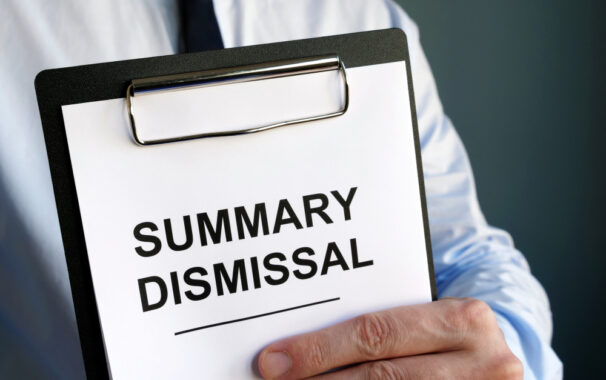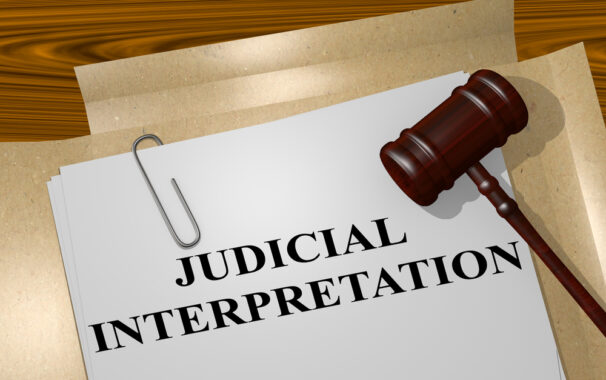
The decedent and his wife had no children, and were close to the wife’s family. The decedent’s wife had predeceased him, and had left him her entire estate. In his Last Will and Testament, the decedent directed that his wife’s relatives were to receive “the total sum of moneys” that he had received from his.. read more →

The decedent, Virginia Ogborne, executed a 2016 will leaving her estate to two of her sons, including David, who she named executor. She left only a nominal bequest to another son, James. After James filed a caveat to the will, David filed an Order to Show Cause to strike the caveat and admit the will.. read more →

The estate documents of the decedent, Lois N. DeConca, included a revocable trust naming “Alzheimer’s Association, New Jersey,” with a Denville New Jersey address, as a beneficiary. After her death, her estate filed a Verified Complaint seeking direction from the court regarding which charity was the intended beneficiary: the National Alzheimer’s Association (AA), headquartered in.. read more →

The decedent’s daughter had been disinherited under her mother’s 2013 Last Will and Testament. Following the decedent’s death, the daughter sought to admit a 2016 draft will, in which she was a beneficiary. The decedent had contacted her attorney beginning in 2015 regarding changes to her 2013 will, and advised the attorney that she did.. read more →

Louis Keppel hired Donna Thomas as a home health aide. Thomas was employed by Angela’s Angels Home Healthcare and Angela’s Angels, LLC. Keppel died intestate. Dolores Guttmann and Thomas Loikith were appointed co-administrators of his estate. Guttmann and Loikith discovered that Thomas misappropriated 192 checks from Louis Keppel over a two-year period. In that regard,.. read more →

In a decision by Honorable Robert P. Contillo, P.J.Ch. that was affirmed by our Appellate Division, the court analyzed complex family relationships to determine if gifts were made in good faith or the result of undue influence. The decedent had two children. Her daughter (the plaintiff) was the executrix and a beneficiary of her estate… read more →

The decedent’s godchildren sought to probate a purported will that the decedent had neither reviewed nor signed. The decedent, who was 90 and in fragile health, had had a telephone conversation with an attorney she had never met. Based upon that conversation, the attorney drafted the decedent’s 17-page will. The decedent never had the opportunity.. read more →

After Mrs. Dreher died and her son probated her will, her daughter filed a complaint objecting to the probate. The plaintiff claimed that the will was the product of undue influence, and that her mother lacked testamentary capacity to sign the will. After four days of trial, the parties settled the case, and the terms.. read more →

Mrs. Jones and her husband had three children: Barbara, David, and Walter. Mr. and Mrs. Jones had owned an investment account with Olde Discount Corporation (the “investment account”) as joint tenants with right of survivorship and, when Mr. Jones died in November 1998, Mrs. Jones became the sole owner. According to the investment firm’s policy,.. read more →

During his relationship with life partner Marc Coleman, the decedent executed a Last Will and Testament naming Coleman as the executor and primary beneficiary of his estate. The couple later ended their relationship. Thereafter, the decedent entered into a new relationship with Kirston Baylock. The decedent later died unexpectedly. At issue was a hand-written codicil.. read more →

The decedent was a widow with no family. She had a close relationship with her neighbors. Shortly after a birthday party for the neighbors’ daughter, she handed the neighbors a check for $100, along with a 5-page document the decedent signed using her nickname, “A.J.” At trial, there was no dispute that the decedent possessed.. read more →

Following their divorce, the decedent, John Garay, and his ex-wife owned a parcel of real property as equal tenants in common. Upon John’s death, the property was owned equally by John’s estate and the ex-wife. The co-executors of John’s estate were two of the Garays’ thirteen children. In 2013, the property was sold to one.. read more →

A New Jersey appellate court ruled that a court can alter the plain and unambiguous language of a trust when extrinsic evidence suggests that the trust language is not what the settlor intended. In the Matter of the Trust of Violet Nelson, Deceased, Docket No. A-4004-15T1 (App. Div. March 28, 2018). Violet and Joseph Nelson had.. read more →

Although the decedent had four children, she left her entire estate to two of the children. However, the will did not mention her two omitted daughters, or the fact that they were being omitted. One of the omitted daughters sued, claiming the will was the result of undue influence or lack of testamentary capacity. The.. read more →

Following Joan McBride’s death, her sons from her first marriage asserted claims against her second husband Charlie, who had served as Joan’s power of attorney and executor of her will. Joan and Charlie married in 1997 and remained married until Joan’s death in 2016. The sons claimed Charlie unduly influenced Joan in connection with certain.. read more →

This appeal concerned the trial court’s ruling that a 2013 deed was valid. The appellants, who were appointed co-executors of the decedent’s will, claimed that the deed was the product of undue influence. The decedent had owned a condominium and, in 2012, she executed a deed conveying that interest to herself and her niece, as.. read more →

The plaintiffs in this case were sisters Ashley Nelson-Guedez and Lyndsay Nelson-Nugent, whose father died in 2007. The plaintiffs’ father, Paul Nelson, predeceased their grandfather. Upon their grandfather’s death, his estate was probated in New Jersey, and Paul’s current wife (Jacqueline Limoli) received Paul’s share of Paul’s father’s estate. Plaintiffs alleged that Jacqueline agreed to.. read more →

The decedent, Dr. Evan Merritt London, was single with no children. He executed a number of wills and trusts over the years, with the trusts as the primary vehicle for disposing of his estate. He would make periodic trust revisions in which his beneficiaries (including his niece and nephew, his best friend, and various charities).. read more →

A court in Australia accepted an unsent, draft text message on a mobile phone as an official Last Will and Testament. Nichol v. Nichol The decedent, Mark Nichol, a 55 year old man, committed suicide in 2016. The decedent’s mobile phone was found on a work bench in the shed where the deceased’s body was found.. read more →
Following Alice Malsberger’s death, her niece by marriage, Patricia White (the plaintiff in this lawsuit) found a handwritten document in Alice’s kitchen. It read: I’m Alice Malsberger – I wish to be cremated upon my death – along with my husband Joe – our ashes placed in a similar (illegible) and placed in mausoleum. I.. read more →
New Jersey appeals court ruled a surviving spouse failed to prove that her deceased spouse made an enforceable gift based on the deceased spouse’s failure to deliver the gift during his life to the survivor. Matter of the Estate of Herenchak, 2015 N.J. Super. Unpub. 2014 WL 9868901 (N.J. Super. Ct. App. Div. June 8,.. read more →
In this case, the New Jersey Supreme Court held that gifts giving rise to a presumption of undue influence include gifts that strip the donor of all or virtually all his assets, and gifts to a donee on whom the donor depends. Pascale v Pascale, 113 N.J. 20 (1988) In 1939, plaintiff, John J. Pascale,.. read more →
In this will contest involving the doctrine of probable intent, Hon. Robert P. Contillo, P.J.Ch. ruled that a court cannot alter the language of a trust that is plain and unambiguous even when extrinsic evidence strongly suggests that the trust language is not what the settlor intended. Violet and Joseph Nelson had three children: Jacob.. read more →
Daughter/Executrix Who Disputed Terms of Mother’s Will is Denied Commissions
Linda Hall was the executrix of her mother’s estate. Hall had initially had a 2005 will admitted to probate. When Hall’s sister, Carol Polak-Reid (“Reid”) filed a complaint alleging that their mother had executed another will in 2011, Hall represented that she had attempted to have the 2011 will admitted, but the surrogate had rejected.. read more →
As a general rule, an attorney hired to prepare a will or trust for a client is usually not liable to the beneficiaries of the will or trust because the beneficiaries are not clients of the attorney. But there are exceptions to the general rule. The general rule and its exceptions are demonstrated in two.. read more →
Categories
- Affordable Care Act
- Alzheimer's Disease
- Arbitration
- Attorney Ethics
- Attorneys Fees
- Beneficiary Designations
- Blog Roundup and Highlights
- Blogs and Blogging
- Care Facilities
- Caregivers
- Cemetery
- Collaborative Family Law
- Conservatorships
- Consumer Fraud
- Contempt
- Contracts
- Defamation
- Developmental Disabilities
- Discovery
- Discrimination Laws
- Doctrine of Probable Intent
- Domestic Violence
- Elder Abuse
- Elder Law
- Elective Share
- End-of-Life Decisions
- Estate Administration
- Estate Litigation
- Estate Planning
- Events
- Family Law
- Fiduciary
- Financial Exploitation of the Elderly
- Funeral
- Future of the Legal Profession
- Geriatric Care Managers
- Governmental or Public Benefit Programs
- Guardianship
- Health Issues
- Housing for the Elderly and Disabled
- In Remembrance
- Insolvent Estates
- Institutional Liens
- Insurance
- Interesting New Cases
- Intestacy
- Law Firm News
- Law Firm Videos
- Law Practice Management / Development
- Lawyers and Lawyering
- Legal Capacity or Competancy
- Legal Malpractice
- Legal Rights of the Disabled
- Liens
- Litigation
- Mediation
- Medicaid Appeals
- Medicaid Applications
- Medicaid Planning
- Annuities
- Care Contracts
- Divorce
- Estate Recovery
- Family Part Non-Dissolution Support Orders
- Gifts
- Life Estates
- Loan repayments
- MMMNA
- Promissory Notes
- Qualified Income Trusts
- Spousal Refusal
- Transfers For Reasons Other Than To Qualify For Medicaid
- Transfers to "Caregiver" Child(ren)
- Transfers to Disabled Adult Children
- Trusts
- Undue Hardship Provision
- Multiple-Party Deposit Account Act
- New Cases
- New Laws
- News Briefs
- Newsletters
- Non-Probate Assets
- Nursing Facility Litigation
- Personal Achievements and Awards
- Personal Injury Lawsuits
- Probate
- Punitive Damages
- Reconsideration
- Retirement Benefits
- Reverse Mortgages
- Section 8 Housing
- Settlement of Litigation
- Social Media
- Special Education
- Special Needs Planning
- Surrogate Decision-Making
- Taxation
- Technology
- Texting
- Top Ten
- Trials
- Trustees
- Uncategorized
- Veterans Benefits
- Web Sites and the Internet
- Webinar
- Writing Intended To Be A Will







Vanarelli & Li, LLC on Social Media